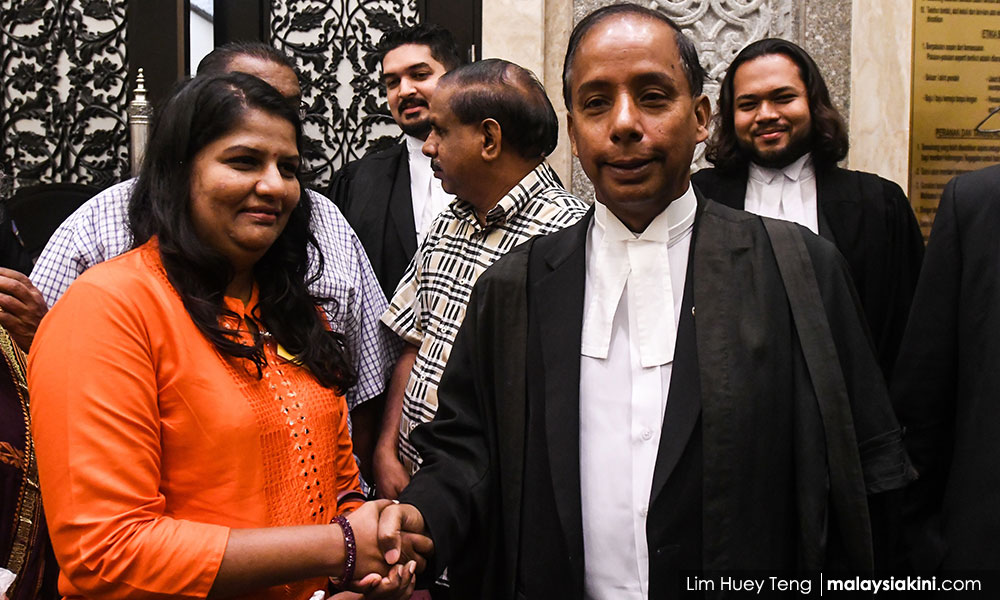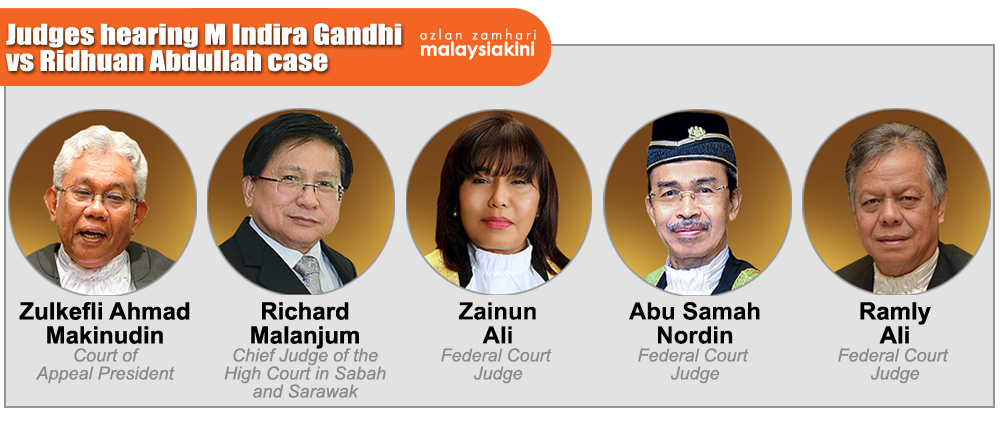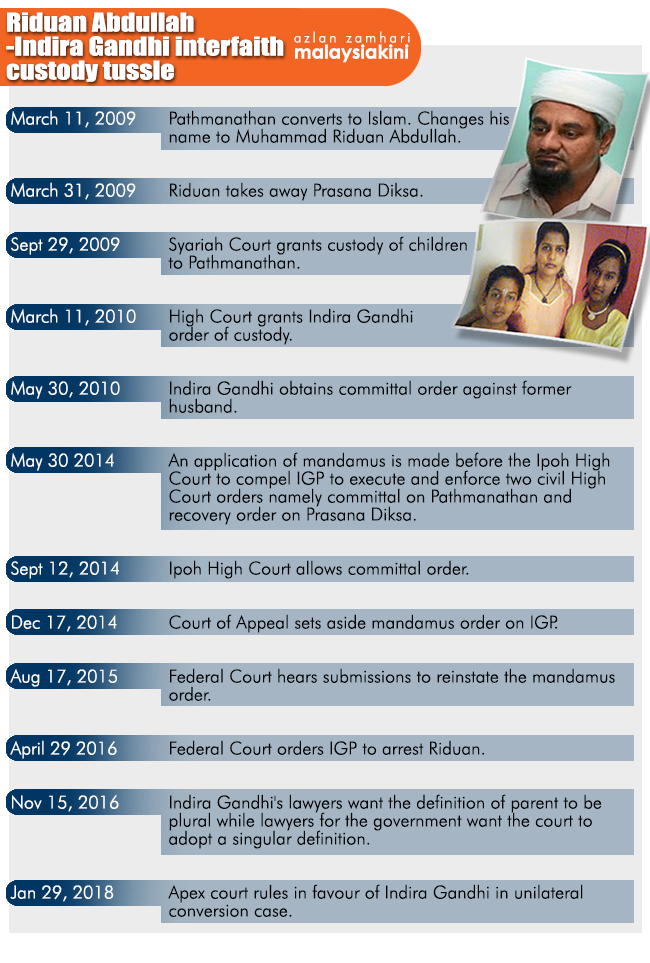A Federal Court judge has reminded the executive and legislature that the powers of judicial review entrusted to the civil courts cannot be taken away even by legislation as it is safeguarded by the Federal Constitution.
Justice Zainun Ali who wrote the landmark unanimous decision in the Indira Gandhi case said in a 101-page judgment now available that the power of judicial review was essential to the constitutional role of the courts and inherent in the basic structure of the constitution.
"It cannot be abrogated or altered by Parliament by way of a constitutional amendment," she emphasised.
The apex court judge also reminded that the judiciary was required to keep other organs and institutions of the country in check as part of its check and balance function.
Citing another judgment in Semenyih Jaya which she also wrote, Justice Zainun said judicial independence and the separation of powers are recognised as a basic structure of the Malaysian constitution where under Article 121 (1) the civil courts constitutional role is as a check and balance mechanism.
"The judiciary is thus entrusted with keeping every organ and institution of the state within its legal boundary. Concomitantly the concept of the independence of the judiciary is the foundation of the principles of the separation of powers.
"This is essentially the basis upon which rests the edifice of judicial power. The important concepts of judicial power, judicial independence and the separation of powers are as critical as they are sacrosanct in our constitutional framework.
"The concepts above have been juxtaposed time and again in our judicial determination of issues in judicial reviews. Thus, an effective check and balance mechanism is in place to ensure that the executive and the legislature act within their constitutional limits and that they uphold the rule of law, " she said.
Read more: 'No mother should go through what I went through'
Citing another Malaysian court case, Justice Zainun said the Malaysian apex court had prescribed that the powers of the executive and the legislature are limited by the constitution and that the judiciary acts as a bulwark of the constitution in ensuring that the powers of the executive and the legislature are to be kept within their intended limit.
She further quoted what former Lord President Salleh Abas had said namely that the courts have a constitutional function to perform and they are the guardians of the constitution within the terms and structure of the constitution itself.
"They (the courts) not only have the power of construction and interpretation of legislation but also the power of judicial review – a concept that pumps through the arteries of every constitutional adjudication and which does not imply the superiority of judges over legislators but of the constitution over both.

"The courts are the final arbiter between the individual and the state and between individuals “inter se” and in performing their constitutional role they must of necessity and strictly in accordance with the constitution and the law be the ultimate bulwark against unconstitutional legislation or excesses in administrative action," said Justice Zainun in quoting Salleh.
The apex court judge said the vital role of judicial review in the basic structure of the constitution, was twofold.
"First, judicial power cannot be removed from the civil courts. The jurisdiction of the High Courts cannot be truncated or infringed.
"Therefore, even if an administrative decision is declared to be final by a governing statute, an aggrieved party is not barred from resorting to the supervisory jurisdiction of the court. The existence of a finality clause merely bars an appeal to be filed by an aggrieved party," Justice Zainun said.
Syariah courts came in later
The judge also said that civil courts existed first before the establishment of the syariah courts which is promulgated in its formation through the state legislature.
"The jurisdiction of syariah courts must be provided for by the state legislature within the limits as it does not have automatic jurisdiction over all the matters," Justice Zainun said.
Justice Zainun also observed that syariah court judges are appointed by the rulers of the respective state after consultation with the relevant state religious council and hence they are not constituted in accordance with the provisions of Part IX of the Federal Constitution entitled “The Judiciary.”
"The constitutional safeguards for judicial independence, including the mechanism for the qualifications, appointment, removal, security of tenure and remuneration of judges, do not apply in respect of the syariah courts," she said.
She also noted that not all syariah courts have the power of review unlike the civil courts.
Justice Zainun said the jurisdiction of the syariah courts was limited by the following:-
- It may not exercise the inherent judicial powers of the civil courts including the power of judicial review;
- It is confined to the persons and subject matters listed in the State List; and
- It must be provided for under the relevant state legislation.
Hence, she said non-Muslims cannot seek remedy there in Islamic matters.
"It is clear therefore that the jurisdiction of the syariah courts, in so far as the operation of Islamic law is concerned, is confined to the private aspect and does not extend to its public one.

"Ultimately the subject matter is one of personal rather than constitutional law; “constitutional law requires that the jurisdiction of the ordinary courts i. e. (civil courts) to rule finally on matters of legality should be preserved," she said.
In the Indira case, Justice Zainun said the civil court was seized with the jurisdiction as the matter was not concerning Islam but the legality of the Registrar of Muallaf to declare her children as Muslims when it is not in dispute that the children did not utter the “kalimah syahadah” (affirmation of faith).
"The subject matter in the appellant (Indira Gandhi's) case is not concerned with the status of her children as Muslims converts or with the question of Islamic personal law and practice, but rather with the more prosaic questions of the legality and constitutionality of administrative action taken by the registrar (of muallaf) in the exercise of his statutory powers.
"In these circumstances and in view of the views expressed, we have no difficulty in concluding that the High Court is seized with jurisdiction, to the exclusion of the syariah court to hear the matter and has rightly done so," she said.
Justice Zainun also conducted a test before seizing jurisdiction to rule that the civil courts had jurisdiction in the matter when she ruled judicial power cannot be vested in the syariah courts, because such courts are not constituted as a “superior court” in accordance with the constitutional provisions safeguarding the independence of judges in Part IX of the Federal Constitution.
"Judicial power cannot be removed from the civil courts, because such powers are part of the core or inherent jurisdiction of the civil courts," she added.
Read more: Indira open to advice on raising daughter as a Muslim
Why children are not Muslims
Justice Zainun and the other members of the apex court bench also emphasised that the determination of the present appeal does not involve the interpretation of any Islamic personal law or principles.
"This has to be made clear. The yardstick to determine the validity of the conversion is the administrative compliance with the express conditions stated in sections 96 and 106 of the Religion of Islam (Perak) Enactment 2004, namely the utterance of the Affirmation of Faith (the “Kalimah Syahadah”) must be complied with and the consent of the parent.
As the children's non-utterance of the “kalimah syahadah” (affirmation of faith) was not in dispute as they were not brought before the registrar, the requirement under Section 96 (1) Religion of Islam (Perak) Enactment 2004 had not been met, the court ruled.
Justice Zainun said the lack of jurisdiction by the registrar renders the certificates of conversion issued a nullity.
"Section 101 (2) of the Perak enactment cannot have the effect of excluding the court's power of judicial review over the registrar's issuance of the certificate. It is settled law that the supervisory jurisdiction of courts to determine the legality of administrative action cannot be excluded even by an express ouster clause," she ruled.
Justice Zainun also put in correct perspective the definition of parents under Article 12 (4) of the Federal Constitution in ruling that an approval by both parents in a civil marriage who are still alive, is required when either spouse wants to convert their children to Islam.
Article 12 (4) states the religion of a person under the age of 18 shall be decided by the parent or guardian.
Justice Zainun said emphasis had been made on the literal meaning of the singular noun but it was merely a case of lost in translation.
"The reason ‘parent’ is used in 12(4) is to provide for a situation where indeed there is only one parent of the child – e.g. a single parent situation.
“But where both parents exist, then the 11th Schedule shall be relied upon," she emphasised in looking at the Guardianship of Infants Act 1964, to rule that if both parents are still alive then their approval is needed if children under 18 are to be converted.
This is a departure in the T Saravanan and R Subashini case.
Justice Zainun's judgment had been heralded as brilliant by former Federal Court judge Gopal Sri Ram.


